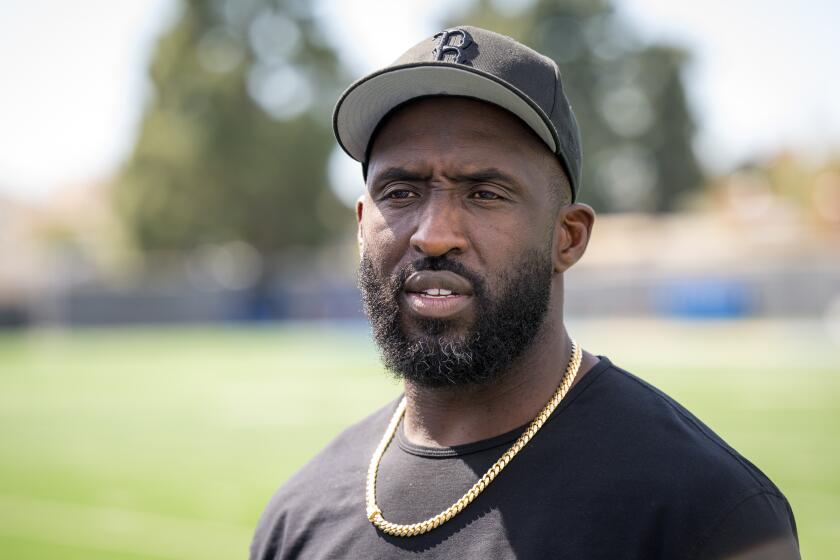‘Voluntary’ Work Seems Necessary
- Share via
“Voluntary” summer conditioning programs are commonplace on college campuses across the country and are seen as necessary by many because of NCAA restrictions on practice time.
In place of coaches, the workouts are usually run by seniors on the team.
Unlike NFL teams, who begin camp in July and have four exhibition games to prepare for the season, college players have no exhibition games and less than three weeks to prepare for regular-season games.
“It’s crazy,” USC trainer Russ Romano said recently. “The NCAA comes out and says all summer workouts are voluntary, but you’ve got to show up to camp in shape. Two weeks of training camp is not enough to get into shape. Training camp is to prepare for Sept. 1, your first game, your season.
“That’s when you put kids at risk, when they don’t do what they’re supposed to do in the summer.”
UCLA has made recent changes to its voluntary summer program to comply with new rules adopted by the NCAA in April.
Mike Linn, Bruin strength and conditioning coach, keeps attendance records but said he does not share them with coaches.
“The records are kept for safety reasons,” Linn said. “If a player missed half the summer conditioning, I want to keep an eye on him in training camp to make sure he’s in shape.”
UCLA’s most strenuous conditioning drill is called the 300-yard shuttle--three sets of six 50-yard sprints in a prescribed time with a short rest between each set.
Players have three opportunities to complete the shuttle, twice during the week before the beginning of training camp and on the first day of camp. Several Bruin players did the shuttle on the first day of training camp. Players must complete it in a prescribed time that varies according to position.
Tight end Bryan Fletcher said that players who do not meet their prescribed time in the 300-yard shuttle must run sprints during fall camp. He said only two players did not make their times this year.
Coach Bob Toledo said Linn is responsible for all Bruin conditioning and that they do not discuss the conditioning level of specific players during the off-season.
“I don’t tell Mike Linn what to do,” Toledo said. “He does what he has to do to get them in condition. When I get here before training camp starts I just want a general gauge.”
Linn said he and UCLA compliance director Rich Herczog had met several times to discuss the new rules. Herczog said the issue of voluntary off-season workouts was addressed at a spring coaches’ meeting and is on the agenda for a fall coaches meeting.
USC’s two compliance officers declined to discuss specific procedures they use to ensure that NCAA rules are followed.
Tim Tessalone, sports information director, said the school’s general practice is to educate coaches and players about rules through the distribution of memos, among other means.
One of USC’s compliance officers spends part of her day working out in the weight room, Tessalone said, where she is able to monitor football players to ensure they are conforming with rules.
More to Read
Go beyond the scoreboard
Get the latest on L.A.'s teams in the daily Sports Report newsletter.
You may occasionally receive promotional content from the Los Angeles Times.









